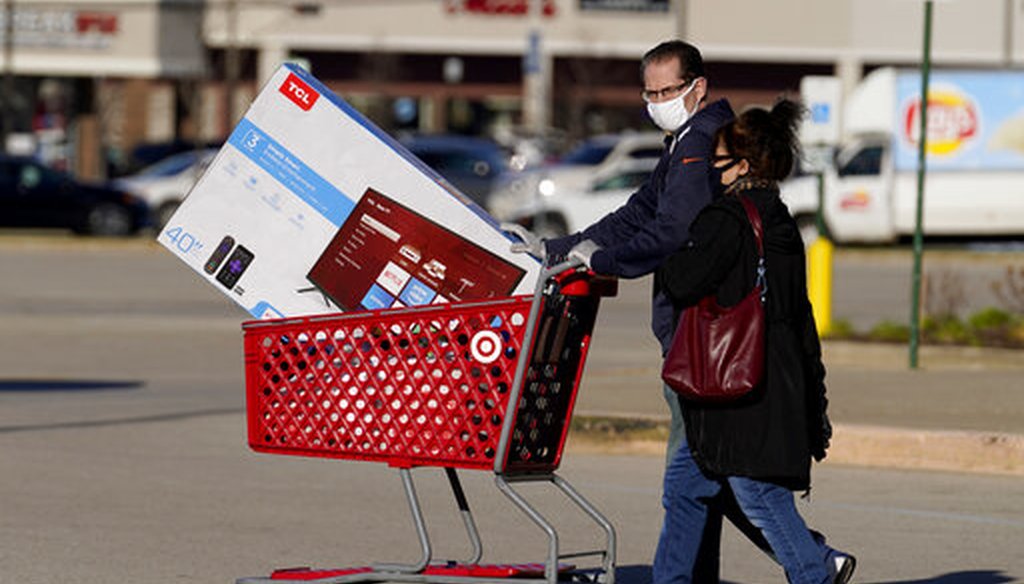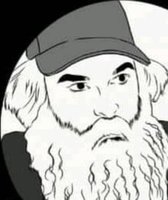Stand up for the facts!
Our only agenda is to publish the truth so you can be an informed participant in democracy.
We need your help.
I would like to contribute

Shoppers leave a Target store after shopping in Niles, Ill., on Nov. 28, 2020. (AP)
If Your Time is short
-
Economic crises are based on factors such as gross domestic product, unemployment rate, and duration.
-
COVID-19 caused the worst economic crisis since the Great Depression, but the current recession is different from the recessions we’ve seen in the past 100 years.
-
It’s too soon to say what the long-term effects of the pandemic will be, since it is still going on.
With COVID-19 cases rising, and parts of California shutting down again, some economists say the COVID-19 recession is going to get worse.
In a Nov. 29 Facebook post, Cori Bush made her own claim about the economy. Bush, a Democrat, was elected on Nov. 3 to serve Missouri’s 1st Congressional District.
"Decades of incremental change led to a moment where we have 265K dead from COVID-19, the worst economic crisis since the Great Depression, an impending climate catastrophe, & a police brutality epidemic," Bush said.
Can Bush really say that it is the worst economy since the Great Depression?
We decided not to give the statement a rating — largely because it is too soon to determine that and given the degree of uncertainty about the future. Still, we wanted to look into how the current economy compares to the past eight decades.
Defining an economic crisis
Bush didn’t respond to PolitiFact’s emails, so we don’t know how she defines an economic crisis. But we know COVID-19 is creating a different economic crisis than any we’ve had in the past 100 years, according to previous PolitiFact reporting.
A big factor: COVID-19 is limiting people’s ability to spend the money that many have. By contrast, MU economics professor Alina Malkova said during the Great Recession in 2008, people were running out of money or going into debt.
That recession took years to recover from. In early 2020, people had money, but they couldn’t spend it because of business closures and shut-downs.
There’s still plenty of uncertainty to when, where and how the pandemic will pass, which leaves uncertainty about the economy as well. According to Allan MacNeill, a professor of political economy at Webster University, there are two common ways to define an economic crisis.
"The two biggest things we look at for an economic crisis are the GDP decline and unemployment," MacNeill said.
Gross Domestic Product, or GDP, is the market value for goods and services within a country over a specific time period. GDP helps measure a company’s economic health.
In order to find out if the current economy is the worst since the Great Depression, we need to compare it with the Great Recession (2007-09), which before 2020 was considered to be the worst economic crisis since the Great Depression. (The Great Depression lasted from 1929-1933 by some accounts, but some argue it lasted until 1939.)
The GDP decline in 2020 far exceeded the decline of the Great Recession. GDP decline in the second quarter of 2020 was 31.4%. MacNeill says this is unprecedented. According to the Federal Reserve, GDP fell by only 4.3% over the two years of the Great Recession.
The unemployment rate in April was also higher than it was during the Great Recession. In April 2020, the unemployment rate was almost 15%, while the Great Recession never went higher than 10%.
Since the GDP decline and the unemployment rate are the highest since the Great Depression, wouldn’t that make it the worst economic crisis? Well, experts say it’s not that simple.
MU economics and public affairs professor Peter Mueser says it’s hard to compare the COVID-19 economy to other recessions and crises. The Great Depression lasted about a decade, while the Great Recession spanned about three years.
In just several months, COVID-19 caused the GDP to decline by 31.4% and the unemployment rate rose from 3.5% to 14.7%. Mueser says the speed at which COVID-19 did this was unheard of.
"It has almost no comparison, in that, in that period," he said. "You know the number of people put out of work and in a short period of time, was essentially unprecedented in the U.S."
But with the unprecedented decline came an unprecedented bounceback. According to the latest Bureau of Labor Statistics report, the unemployment rate is now at 6.7%. In the third quarter, the GDP went up by 33.1%, which MacNeill says is an amazing recovery.
While the Great Recession took years to improve significantly, the COVID-19 economy is recovering in just a few months. The problem is, economists don’t know where the economy will go from here. The key unknowns are how much assistance the federal government provides to support the recovery, and how well, and how quickly, a coronavirus vaccine enables economic activities to go back to normal.
MacNeill says he hopes this crisis doesn’t last several years, but there’s a real possibility that things could get worse.
"You know, in the Great Recession, there were lots of job losses that were permanent. That wasn't that long ago, really. And this is another big hit," MacNeill said.
Mueser says if the vaccine comes out and everything continues improving within the next year, the COVID-19 economy will not be considered worse than the Great Recession, which would mean it is not the worst economy since the Great Depression, either. However, Mueser can’t rule out that the economy will take a dip again.
"I think the best guess is that we aren't going to have improvement in the next four or five months," Mueser said.
Both MacNeill and Mueser agree it's too early to call it the worst economic crisis since the Great Depression. There’s simply no way of telling how long it will last.
Our Sources
Interview, Allan MacNeill, Webster University professor of Political Economy, Dec. 2
Interview, Peter Mueser, MU professor of economics and public affairs, Dec. 3
Cori Bush Facebook Page, Nov. 29 Facebook Post, Nov. 29.
Investopedia, Gross Domestic Product, Dec. 5
Trading Economics, United States GDP, Dec. 5
St. Louis Federal Reserve, Unemployment Rate, Dec. 5
Bureau of Labor Statistics, Employment Situation Summary, Dec. 5
The Balance, US Unemployment Rate History, Dec. 5
Federal Reserve History, The Great Recession, Dec. 5
Interview, Alina Malkova, MU professor of economics, Nov. 13, 2020
PolitiFact, Vicky Hartzler Fact-Check, Nov. 18 2020
Politifact, How the 2008 and 2020 recessions will be different, Dec. 8 2020






























